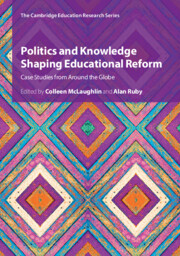Book contents
- Politics and Knowledge Shaping Educational Reform
- Politics and Knowledge Shaping Educational Reform
- Copyright page
- Contents
- Figures and Tables
- Contributors
- Preface
- 1 Introduction
- 2 Radical Curriculum Change and the Politics of ‘Implementation’
- 3 Towards a Play-Based Pedagogy in Ghanaian Kindergarten Education
- 4 Implementing Fee-Free Education in Rwanda
- 5 Policy Implementation in a Sisyphean State
- 6 Reforming the School System
- 7 Educational Reform in Scotland
- 8 The Role of Textbooks in Improving Education in Portugal
- 9 Turning Social Capital into a Working Wage
- 10 High-Performance and Equity
- 11 Missing Opportunity?
- 12 Conclusion
- Index
- References
2 - Radical Curriculum Change and the Politics of ‘Implementation’
A South African Case Study
Published online by Cambridge University Press: 06 February 2025
- Politics and Knowledge Shaping Educational Reform
- Politics and Knowledge Shaping Educational Reform
- Copyright page
- Contents
- Figures and Tables
- Contributors
- Preface
- 1 Introduction
- 2 Radical Curriculum Change and the Politics of ‘Implementation’
- 3 Towards a Play-Based Pedagogy in Ghanaian Kindergarten Education
- 4 Implementing Fee-Free Education in Rwanda
- 5 Policy Implementation in a Sisyphean State
- 6 Reforming the School System
- 7 Educational Reform in Scotland
- 8 The Role of Textbooks in Improving Education in Portugal
- 9 Turning Social Capital into a Working Wage
- 10 High-Performance and Equity
- 11 Missing Opportunity?
- 12 Conclusion
- Index
- References
Summary
This chapter presents a special instance of education reform in which South African students presented a compelling case for curriculum change under decolonization. At first, it appeared that all conditions for successful change were in place – receptive university leadership; compelling educational rationale; pressing political demand; and widespread support among academic teachers. A massive colonial statue was toppled of the imperialist Cecil John Rhodes on the University of Cape Town campus. For a short but powerful moment (2015–2016) academic faculties refocused their energies on critical concepts such as decoloniality, what it might mean and how it could be implemented. Special seminars, invited speakers, funded projects, senate authorizations, and commissioned task teams sprung into action to “decolonize the curriculum.” Five years later, little had changed both for the disciplinary curriculum (e.g., sociology or chemistry) or the institutional curriculum (i.e., the rules and regulations that govern legitimate knowledge). Why? Based on interviews with more than 200 academic teachers across 10 universities, this case study demonstrates how exactly institutions temper radical ideas. This is a specific case of radical reform in a broader struggle to decolonize knowledge from Cape Town and Bristol to Antwerp and South Carolina.
- Type
- Chapter
- Information
- Politics and Knowledge Shaping Educational ReformCase Studies from Around the Globe, pp. 14 - 27Publisher: Cambridge University PressPrint publication year: 2025

